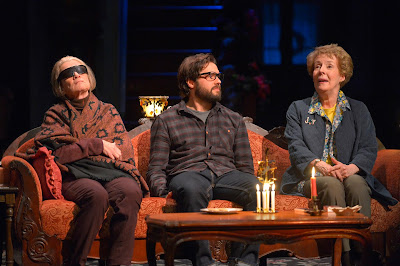The Dramatic Power of Thinking: Annie Baker's John
By Simon Hodgson
“Thinking is potentially as dramatic a force onstage as speaking,” says Ken Rus Schmoll, the director of A.C.T.’s production of John, currently running through April 23 at The Strand Theater. “Personally, I am obsessed with thinking onstage: what actors think, what characters think, how thinking actually occurs, how thinking is represented to be happening.”
In John, the latest play from Pulitzer Prize–winning playwright Annie Baker, there is a lot of thinking and watching. Twentysomethings Jenny and Elias arrive late at night to a bed-and-breakfast in Gettysburg. Already tense and tired, they are greeted by the eccentric proprietor Mertis. Over the next 48 hours, the characters argue, discuss philosophy, and attempt to communicate with each other.
Baker presents these moments to us as realistically as possible. The set feels like a bed-and-breakfast. The lighting is more natural than theatrical. Even the dialogue feels natural. “We watch Annie’s plays unfold, with their real-time silences and events,” says Schmoll. The conversations of the characters in John is filled with the everyday false starts—hesitations, pauses, what people say, what they leave unsaid—that have become Baker’s trademark. “Ms. Baker may just have the subtlest way of exposition of anyone writing for the theater today,” says New York Times theater critic Charles Isherwood.
Baker’s naturalistic writing has earned her comparisons with Anton Chekhov, not least by Isherwood. “There is something distinctly Chekhovian,” he says, “in the way her writing accrues weight and meaning simply through compassionate, truthful observation.” Baker herself is a fan of the Russian playwright, and wrote an adaptation of Uncle Vanya (produced in 2012 by Soho Rep. and starring Georgia Engel). “I love that his plays are ultimately about inner conflict, not outer conflict,” says Baker. “They’re plays about people in dialogue with themselves.”
Although the extended naturalism and real-time quality of Baker’s work has been a challenge to some audiences weaned on 90-minute shows, most critics have only focused on the rewards of Baker’s work. In her review of John, New Yorker writer Sarah Larson said, “I get mad when people complain about the length of Baker’s plays, or even joke about it. Three hours is insultingly long for a bad play or an indulgent play—ninety minutes can be too long—but three hours for a fantastic play not only isn’t onerous, it’s a gift.”
John runs through April 23 at A.C.T.’s Strand Theater, 1127 Market St. Click here to purchase tickets through our website. Want to learn more about Annie Baker and Gettysburg bed-and-breakfasts? Click here to purchase Words on Plays, A.C.T.'s in-depth performance guide series.
“Thinking is potentially as dramatic a force onstage as speaking,” says Ken Rus Schmoll, the director of A.C.T.’s production of John, currently running through April 23 at The Strand Theater. “Personally, I am obsessed with thinking onstage: what actors think, what characters think, how thinking actually occurs, how thinking is represented to be happening.”
 |
| Ann McDonough (Genevieve), Joe Paulik (Elias), and Georgia Engel (Mertis) in A.C.T.'s 2017 production of John. Photo by Kevin Berne. |
Baker presents these moments to us as realistically as possible. The set feels like a bed-and-breakfast. The lighting is more natural than theatrical. Even the dialogue feels natural. “We watch Annie’s plays unfold, with their real-time silences and events,” says Schmoll. The conversations of the characters in John is filled with the everyday false starts—hesitations, pauses, what people say, what they leave unsaid—that have become Baker’s trademark. “Ms. Baker may just have the subtlest way of exposition of anyone writing for the theater today,” says New York Times theater critic Charles Isherwood.
Baker’s naturalistic writing has earned her comparisons with Anton Chekhov, not least by Isherwood. “There is something distinctly Chekhovian,” he says, “in the way her writing accrues weight and meaning simply through compassionate, truthful observation.” Baker herself is a fan of the Russian playwright, and wrote an adaptation of Uncle Vanya (produced in 2012 by Soho Rep. and starring Georgia Engel). “I love that his plays are ultimately about inner conflict, not outer conflict,” says Baker. “They’re plays about people in dialogue with themselves.”
Although the extended naturalism and real-time quality of Baker’s work has been a challenge to some audiences weaned on 90-minute shows, most critics have only focused on the rewards of Baker’s work. In her review of John, New Yorker writer Sarah Larson said, “I get mad when people complain about the length of Baker’s plays, or even joke about it. Three hours is insultingly long for a bad play or an indulgent play—ninety minutes can be too long—but three hours for a fantastic play not only isn’t onerous, it’s a gift.”
John runs through April 23 at A.C.T.’s Strand Theater, 1127 Market St. Click here to purchase tickets through our website. Want to learn more about Annie Baker and Gettysburg bed-and-breakfasts? Click here to purchase Words on Plays, A.C.T.'s in-depth performance guide series.

